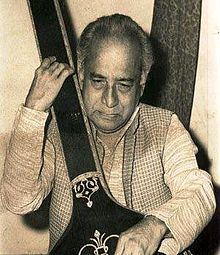Vasant Rao Deshpande came to Guruprasad to perform before Meher Baba
That afternoon at 3 P.M., the noted singer Vasantrao Deshpande gave a performance. During one of his songs, Baba suddenly turned to a woman sitting near him and remarked, “While you are here, think of me. One who thinks of others is not present here.”
After Deshpande’s program in the main hall ended, most of the group left. Baba, instead of retiring to his room, went and sat in the smaller mandali hall, adjacent to the main hall. A few close lovers had remained and sat around him. Baba’s expression was grim and he appeared disturbed. After some light conversation, he asked Madhusudan and the Poona bhajan mandali to sing a few more ghazals.
[LM Page:4973] Year 1963
Baba then entered the main hall and Vasantrao Deshpande sang Indian classical music for about 20 minutes. Afterward Mohan-Saigal sang ghazals, which Baba especially enjoyed. Then everyone sang Baba’s arti, and those leaving that day embraced him.
[LM Page:5008] Year 1963

 Vasantrao Deshpande (2 May 1920 – 30 July 1983) was a Hindustani classical vocalist renowned for his contribution to Natya Sangeet (musical dramas). Vasantrao Deshpande got trained under several gurus, in various different schools of singing. He began his musical training with Mstr. Shankarrao Sapre of Gwalior, a disciple of V. D. Paluskar,in Nagpur. His training was alongside C. Ramchandra under their Guru Master Shankarrao Sapre. After this, he studied under several musicians including Sureshbabu Mane (son of Ustad Abdul Karim Khan) of Kirana gharana, Asad Ali Khan of Patiala gharana, Aman Ali Khan and Anjanibai Malpekar of Bhendibazaar gharana, and Ramkrishnabuwa Vaze (Vazebuwa) of the Gwalior gharana.Dinanath Mangeshkar, a direct disciple of Vazebuwa, had a particularly strong influence over Deshpande, who is regarded as Mangeshkar’s musical heir, having adopted his signature mercurial and dramatic style of singing.
Vasantrao Deshpande (2 May 1920 – 30 July 1983) was a Hindustani classical vocalist renowned for his contribution to Natya Sangeet (musical dramas). Vasantrao Deshpande got trained under several gurus, in various different schools of singing. He began his musical training with Mstr. Shankarrao Sapre of Gwalior, a disciple of V. D. Paluskar,in Nagpur. His training was alongside C. Ramchandra under their Guru Master Shankarrao Sapre. After this, he studied under several musicians including Sureshbabu Mane (son of Ustad Abdul Karim Khan) of Kirana gharana, Asad Ali Khan of Patiala gharana, Aman Ali Khan and Anjanibai Malpekar of Bhendibazaar gharana, and Ramkrishnabuwa Vaze (Vazebuwa) of the Gwalior gharana.Dinanath Mangeshkar, a direct disciple of Vazebuwa, had a particularly strong influence over Deshpande, who is regarded as Mangeshkar’s musical heir, having adopted his signature mercurial and dramatic style of singing.
Awards
1982 – Sangeet Natak Akademi Award
[Wiki]

Please feel free to contact us for any corrections/omissions

